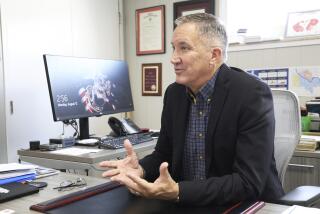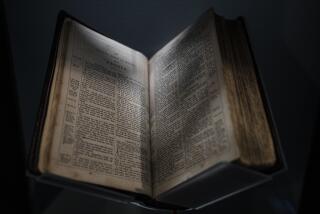A Question of Access for Bible Groups
- Share via
Nine years ago, Congress decided that student groups whose activities were not directly related to a school’s curriculum could meet on school premises. A few months later, a small and independent school district in the Santa Clarita Valley fashioned its own policy. In response to Congress’ action, the William S. Hart Union High School District declared that non-curriculum-based student groups were free to meet at schools, on weekdays, during the time between the end of classes and the closing of main administrative offices.
The policy also set down rules for groups that could meet inside the schools during the instructional day. These groups, which were allowed to meet during the lunch hour, had to be related to the curriculum, such as a science club related to a particular course or courses.
These standards for group meetings were defensible. Over the years, however, they have perhaps been poorly policed.
For instance:
In the Hart district, two student-based Christian groups, in apparent compliance with the Hart policy, began conducting Bible study groups outside of their respective high school buildings during the lunch hour. This was appropriate.
But the groups, their parents and other supporters now suggest that the school district’s policy has not been followed, that other non-curriculum-based groups have in fact been using classrooms inside schools during lunch, and that their Bible study groups should be allowed to as well. What should be done here?
First, the school board must assure, to its own satisfaction, that these study groups are in fact engaged exclusively in studying, and are not some thinly veiled attempt to establish a prayer group that would have no place in a school building. At that point, the board has some clear choices to make.
It can stick with the aforementioned policy and police it, barring non-curriculum-related groups that now use classrooms during the lunch hour and restricting all of them to after-school classroom use. It can expand its “open forum” standard to allow such groups to meet inside the schools during lunch. That would presumably mean that it would have to allow the same access to Bible study groups. A third option would be to decide that it will close its schools entirely to extracurricular groups.
It is our understanding, based on conversations with Hart Union school district officials, that the Bible study groups would already be allowed to hold their studies inside the schools before the start or after the end of the instructional day. That seems reasonable to us. If the students are unable to meet after school because of other commitments, the district could consider access to the buildings before classes begin. In all fairness, however, it would require barring all extracurricular groups from meeting inside the schools during school hours. If that had been done before, this controversy might not have surfaced.
More to Read
Sign up for Essential California
The most important California stories and recommendations in your inbox every morning.
You may occasionally receive promotional content from the Los Angeles Times.













